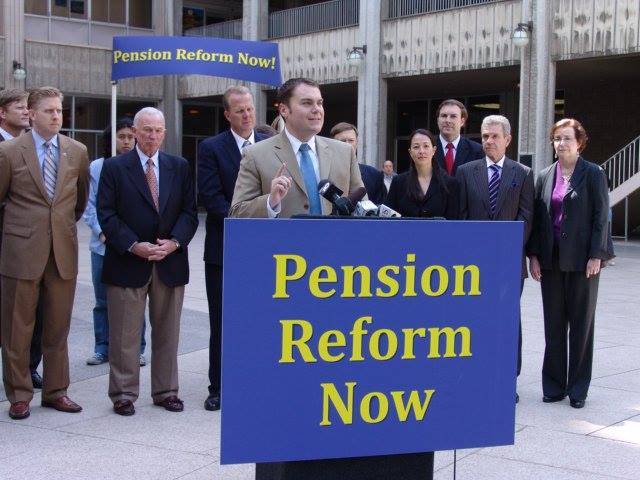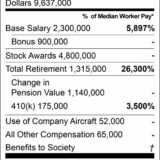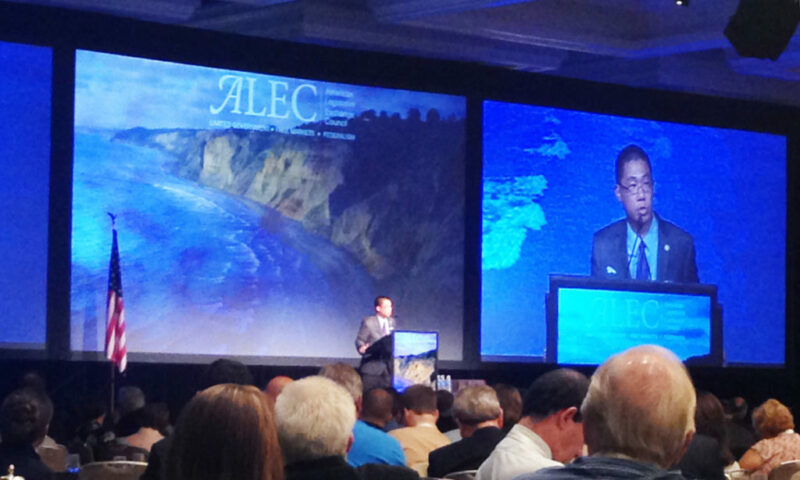

A nationwide group of self-described small and independent business owners has joined the legal battle to appeal California’s landmark lead paint court ruling. But questions have arisen about the actions of the National Federation of Independent Business (NFIB), which, through its Small Business Legal Center, is part of an amici curiae (“friends of the court”) brief filed on behalf of the defendants in California’s 6th Appellate District Court of Appeal in San Jose.
Why is NFIB, which reports that most of its member businesses employ only three to five workers, going to bat for the case’s three multinational corporate defendants?
About 1.5 million homes in L.A. County built before 1978 probably contain lead-based paint.
In December 2013, Santa Clara County Superior Court Judge James Kleinberg ordered ConAgra, Sherwin-Williams and National Lead (NL Industries) to pay $1.15 billion to three California cities and seven counties,
» Read more about: ‘Mom and Pop’ Business Group Fights Lead Paint Ruling »


Last week, in a powerful affirmation of the common good, commissioners in Tennessee’s Johnson County unanimously opposed the privatization of the state prison within their county’s limits. A response to fears that the state government could soon outsource management of the Northeast State Correctional Complex, the resolution reads like a checklist of what democracy and public control can provide a community.
The “no” vote was prompted by the state government’s recent exploration of outsourcing the management of state properties, including prisons, hospitals, parks and even the University of Tennessee. State officials have also been trying to manage a shortage of prison officers after introducing a controversial overtime policy statewide to cut costs.
But the Johnson County commissioners recognize that outsourcing isn’t the answer: “Any type of privatization would be detrimental to our county, citizens and staff of Northeast Correctional Complex.” They also honored public service by dedicating a day each year in recognition of the prison’s current staff.
» Read more about: Counties Say No to Privatizing Their Prisons »
If L.A.’s landlords have their way, California’s ongoing drought woes could result in many renters having to foot the bill for their water usage. Owners are nudging city leaders to study a survey released in July by the landlord group Apartment Association of Greater Los Angeles (AAGLA).
The report claims that more than 86 percent of rental property owners in the city who pay for their tenants’ water have experienced an increase or seen no change in water usage since Governor Jerry Brown ordered mandatory restrictions in April. Landlords assert that renters have no incentive to conserve water because they aren’t paying for it, resulting in higher water costs.
Some tenant groups are crying foul, however, claiming that this proposal is little more than an attempt by landlords to use the drought to circumvent rent control laws. Los Angeles forbids owners of buildings constructed before 1979 to pass on water costs to tenants.
» Read more about: L.A. Landlords Seek to Put Tenants on the Hook for Water Bills »


If you try to play Monopoly with a two year old, you will not win.
Sure, you may be better at buying up property, building hotels and following rules about when to pass Go – good on you. But when the two year old decides he’s playing a different game, like Throw the Entire Board at the Adult, that game and its goals will absolutely trump yours.
Disruption went from Silicon Valley buzzword to cliché years ago, but it persists as an operational goal for countless tech startups and their investors. (See Judith Shulevitz’s excellent 2013 exploration of the term.)
We still see such supercharged words as reinvent, reimagine and revolutionize as investors search for the next “unicorn” – the term for a startup valued at more than $1 billion.
» Read more about: Do Unicorns Play Monopoly? Ask Uber and Amazon »


Backers of a proposed statewide ballot measure that would radically change the way wages and pensions of California’s government employees are formulated have begun an email campaign seeking pledges of support for the measure – as well as volunteers to circulate signature petitions when they become available in a few weeks.
The pension activists have 180 days from August 11, the date Attorney General Kamala D. Harris assigned a full title and ballot summary to the measure, in order to qualify it for the November, 2016 election.
Such email campaigns can help an initiative qualify for the state ballot if coupled with other efforts, Mike Madrid of Grassroots Lab, a Sacramento-based public affairs group, told Capital & Main by phone. “But if it is the only thing you are doing the chances for success are slim.”
In ballot-box politics, the bottom line is money.
» Read more about: Leaders of Pension-Cutting Ballot Proposal Look for Supporters Online »


As public officials across the country continue to manage shrinking budgets, experiments for funding public services are emerging. One new idea, the Social Impact Bond, has been advertised as a “win-win” for private investors and the public, but the reality is beginning to look a little different.
The results are in from the first SIB tried in the U.S. and it failed to meet its goals. The SIB was aimed at reducing the rate by which adolescents housed on Rikers Island returned to jail, with a goal of at least an 8.5 percent drop. Therapy was provided to inmates, but recidivism wasn’t significantly reduced.
SIBs are complex arrangements—private investors lend funding for a program and the government repays them only if certain goals are met. For the Rikers SIB, New York City was lent millions by Goldman Sachs, backed by Bloomberg Philanthropies.
Proponents of SIBs claim that,
» Read more about: Wrong Island: Why Are Privatizers Applauding Failed Prison Experiment? »


When the U.S. Census Bureau released figures identifying California as having the highest poverty rate in the nation, the news would not have shocked the 4.8 million low-wage earners at the bottom of California’s income divide. For those single workers and families that subsist paycheck to paycheck, and too often make up the difference by maxing out credit cards or taking out predatory short-term loans, life’s a precarious balancing act even when things go well.
But when unforeseen calamities strike, such as serious health emergencies or the loss of a job, hard-pressed households are left without a safety net. Unable to keep up payments, loans fall into default and too often result in crippling court-ordered garnishments that claim up to a quarter of earnings.
SB 501 quickly ran afoul of the powerful California Bankers Association and debt-buyer lobbyists.
“We see increasing numbers of these families in our legal aid services throughout the state,” the Western Center on Law and Poverty’s Jessica Bartholow told Capital &
» Read more about: Garnishing California's Future: New Bill Seeks to Curb Wage Seizures »


Here’s the good news: The percentage rate of change in global carbon emissions in 2014 was zero. It didn’t go up. That’s the first time in the record books that the world economy grew but carbon emissions didn’t. Here’s the bad news: The average global temperature has been hotter every month since February of 1985 than the 20th century average for any given month. We’re talking 360 consecutive months of warmer-than-average temperatures.
Here’s the really bad news: If we continue to extract fossil fuels – coal, oil, gas – at the current pace, we will not be able to live on the planet by mid-century.
We must leave 80 percent of our coal, oil and gas in the ground, if civilization is to survive.
Here’s the science: Despite the climate deniers, the consensus of people who study this field professionally say that if we raise the temperatures of the planet more than two degrees Celsius (that’s about 3.6 degrees Fahrenheit) human life as we know it will not be possible.
» Read more about: Dethroning Fossil Fuels: The Rise of the New Abolitionists »


You might not think that one additional figure in the thick of annual financial reports would be a serious threat to our major corporations, but you’d be underestimating big business lobbyists’ penchant for hysteria. A simple rule finally passed by the Securities and Exchange Commission (SEC) last week drew more than a quarter million comments and 1,500 letters to the commission – add a large stack of articles and op-eds, and one can imagine quite a number of people with steam shooting out of their ears.
In a 3-2 vote August 5, the SEC adopted a new rule requiring that companies disclose a comparison of CEO pay with worker pay. This disclosure rule was a mandate of the Dodd-Frank Act, the 2010 legislation passed in the wake of the recession, and will take effect in 2017. Labor groups and others concerned with economic inequality had pushed hard for the SEC to move forward on it.
» Read more about: Explosive Information: Worker Pay Disclosure Ignites Fear in Biz Lobby »


On Tuesday California Attorney General Kamala D. Harris released the full title and summary text for the Public Employees Pension and Retiree Healthcare Benefits Initiative Constitutional Amendment. The title is a mouthful, but the initiative’s wording is just six sentences long.
Its first two lines read: “Eliminates constitutional protections for vested pension and retiree healthcare benefits for current public employees, including those working in K-12 schools, higher education, hospitals and police protection, for future work performed. Adds initiative/referendum powers to Constitution, for determining public employee compensation and retirement benefits.”
Crucially, Harris omits mention of “empowering” voters — a main selling point that had been advertised by former San Jose mayor Chuck Reed, former San Diego City Councilman and Tea Party member Carl DeMaio, and four others. In June this group submitted their proposed ballot initiative to Harris as the Voter Empowerment Act of 2016. Harris’ new title weakens their cause,


This week, the American Correctional Association (ACA) will hold its annual conference in Indianapolis, where thousands of government corrections officials, including wardens, jail administrators and sheriffs, will attend workshops and connect with their peers from across the country. Workshops include best practices for successful reentry programs for released inmates and working in corrections across generations.
But many workshops and events will feature a Who’s Who of private corrections companies, including Corrections Corporation of America (CCA), GEO Group, Aramark, Corizon and Telmate.
Those companies should be familiar—many have been prominent in reports we’ve released over the past few years detailing the suffering of inmates in private hands, such as thousands of medical malpractice claims and stories about maggots appearing in prison food.
On the eve of the ACA conference, we have released a new report revealing how such conferences allow corrections companies to influence government officials in ways outside the public’s oversight.
» Read more about: Politically Correctional: How Businesses Game Prison Conferences »
…mill hands, farm hands, factory hands…hands….hands…hands…
— Eugene Debs
Ironworker Devonte Merrifield makes sure he takes care of his hands. He jokingly points out that the strength of his marriage depends on two strong – and sometimes soft – hands. “My wife complains because I can’t rub her back anymore because of my calluses. My hands can be a little rough,” he says, lifting his hands and smiling.
Merrifield is in some ways similar to my electrician father who believed that the feel of a person’s hands might indicate something about their character. Shaking my father’s hand was not merely a polite ritual. The absence of thick pads of calluses was, for him, one indication that you might not be contributing much to society.
Merrifield knows that what he does with his hands is deserving of a measure of respect. His identity is partly bound up with what he calls his “working man’s” hands and the confidence drawn from meeting the challenges of apprenticeship.


Earlier this month, in yet another win for local control, leaders in one central Florida county rejected a proposal from a for-profit library management company to take over their public library. The company, Library Systems & Services (LSSI), operates at least 80 public libraries across the country, but Marion County joins a growing list of municipalities that realized that LSSI’s claim to do more with less while still making a profit was a greater fiction than even Stephen King’s best stories.
In 2010, the chief executive of LSSI admitted to the New York Times that the company saves money by cutting overhead and replacing unionized employees. “Cutting overhead” can mean fewer services and reduced hours. Privatized libraries make up for less professional staff by depending on unpaid volunteers and automation. Of course, when outsourcing relies on cutbacks in wages and benefits to realize savings,
» Read more about: Calabasas and Other Towns Reject Privatized Libraries »


Scott Walker couldn’t have asked for more.
When the Wisconsin governor took the dais Thursday at the American Legislative Exchange Council’s annual conference in San Diego, his audience was ravenous for any vision that included destroying unions and cracking down on America’s criminal underclass.
See more of our coverage of the ALEC Annual Meeting
The venue was the plenary croissants-and-eggs breakfast, but it would be hard to imagine an audience hungrier for the red meat Governor Walker threw out to it.
Every key bill Walker has been associated with, since his get-tough-on-crime heyday as a state assemblyman in the 1990s, has been a plagiarism of an ALEC model bill. Such as laws that eliminated parole (and ballooned state prison populations) or that imposed a voter ID law, gutted public education and teacher protections, and made Wisconsin the 25th right-to-work state.
Walker himself isn’t an actual member of the secretive corporate lobbying network (ALEC only admits legislators,
» Read more about: ALEC Confidential: Scott Walker Talks the Walk »


For several tense hours yesterday San Diego’s plush Manchester Grand Hyatt hotel, located in the city’s Embarcadero district, felt more like Athens’ besieged Parliament than a resort on California’s laid-back shoreline.
Around 2 p.m. the hotel, which is playing host to this year’s annual meeting of the American Legislative Exchange Council (ALEC), sealed off all entrances except its main lobby in what became a virtual lockdown.
See more of our coverage of the ALEC Annual Meeting
For the 1,300 state legislators and corporate lobbyists gathered inside, the perceived security threat turned out to be from those who stand the most to lose from ALEC attacks on workplace rights, minimum wage laws and state health and environmental standards — California workers.
An estimated 2,500 protestors, carrying placards declaring California to be an “ALEC-Free Zone,” gathered around 1 p.m. in Embarcadero Marina Park to hear a series of speakers lambasting the secretive,
» Read more about: Labor Rally Sends ALEC Conference Into Lockdown Mode »


The 42nd Annual Meeting of the American Legislative Exchange Council (ALEC) got underway in earnest Wednesday at San Diego’s Manchester Grand Hyatt resort hotel. The mood was convivial and the attire corporate casual: Brooks Brothers suits without ties, Dockers and sports shirts.
Although this year’s star attractions — a GOP presidential frontrunner, Wisconsin Governor Scott Walker, and a returning presidential contender, former Arkansas Governor Mike Huckabee — weren’t scheduled to speak until Thursday, conference delegates had plenty to do yesterday.
The packed opening luncheon featured Iowa’s virulently anti-immigrant Congressman, Steve King.
ALEC, a secretive rightwing bill mill that gets its funding from the Koch Brothers and global multibillion dollar corporations, has been described as a legislative dating service that arranges hookups between mostly Republican state lawmakers and corporate lobbyists.
See more of our coverage of the ALEC Annual Meeting
The actual “dates” occur at meetings like those unfolding in San Diego — a council spokesperson said 1,300 conferees were in attendance — and take place behind locked doors,
» Read more about: ALEC Confidential: Inside the San Diego Conference »


The line of people standing outside the event in downtown Los Angeles snaked out the door and down to a sidewalk—but there were no velvet ropes and it wasn’t at Nokia Center or L.A. LIVE. The venue was the Kenneth Hahn County Hall of Administration.
The hundreds who waited Tuesday morning in muggy heat had come to weigh in on a measure before the Board of Supervisors to increase the minimum wage in L.A. County’s unincorporated areas.
Perla Lagunas and her kids traveled from North Hills in the San Fernando Valley to show support. “I represent a low-income community,” she said. Her mother was a garment worker who struggled with bills and groceries. “My mom worked with people who wouldn’t pay her a good wage. We grew up so poor– sometimes we didn’t have food. We want to let the community know—wake up!”
Representatives from the National Council of Jewish Women stood in line to enter the hearing.


Steven Luftman did not have much to feel good about last Tuesday as he stood in the TSA line before catching a flight from Sacramento to Los Angeles. After all, he was in the process of being evicted from his Fairfax District rental under the state’s Ellis Act, a law that speculators often use to kick out longterm renters from their homes in order to redevelop a property for higher profits. But then Luftman realized who he was standing behind: Matthew Jacobs, the man responsible for his eviction.
Hours before, the two had squared off during the July 14 meeting of the California Housing Finance Agency (CalHFA) in which Jacobs, an agency chairman who had been facing mounting criticism for his efforts to evict dozens of tenants who live in complexes in Los Angeles’ Beverly Grove and Fairfax neighborhoods, announced he was quitting the agency.
“He was right in front of me —
» Read more about: Demolition Man: Developer Matthew Jacobs Quits Housing Agency »


The town of Coatesville, Pennsylvania, outside of Philadelphia, is a former steel mill town full of struggling residents. With a per capita income of $14,079, Coatesville is situated in wealthy Chester County, but it has struggled amid a declining population and lack of job opportunities. Missoula, Montana, on the other hand, was once a thriving lumber town. Its per capita income of $17,166 means it’s slightly wealthier than Coatesville, and the University of Montana and two hospitals are major employers for the city.
Two thousand, three hundred miles separate Coatesville from Missoula, but the two towns have more in common than you might think. One important similarity? Their ongoing struggles with private, for-profit water companies, like too many cities around the U.S.
Coatesville officials sold the public water utility in 2001, hoping to use the one-time cash infusion to spark an urban renaissance while the privately-run PAWC promised to invest in desperately needed modernization and maintenance.


Hopes were high among environmentalists when a bill designed to protect California’s drinking water was introduced in the state Assembly earlier this year. After all, California has passed some of the most far-reaching environmental laws and regulations in the nation, and the state legislature is dominated by the Democratic Party, whose members are generally inclined to vote for tougher environmental standards. Moreover, California is in the midst of a massive drought, which gave the bill more urgency. And besides, clean water isn’t a threatened desert flower or endangered minnow – it’s something everyone depends on for existence.
It never had a chance.
The measure, Assembly Bill 356 (Das Williams, D-Carpinteria), was intended to protect underground sources of drinking water from oil and gas wastewater disposal and enhanced oil recovery treatments, and called for monitoring near certain injection wells. That immediately put it in the crosshairs of the most powerful oil interests in California,
» Read more about: How Democrats Mixed Oil and Water, Killing Environmental Bill »